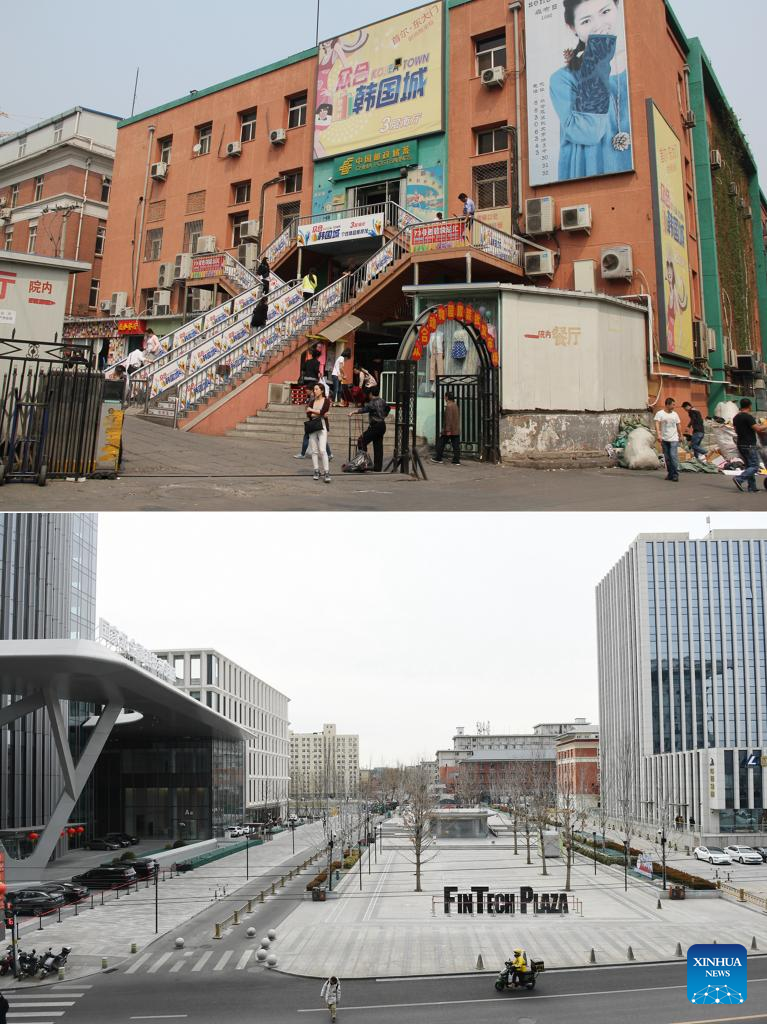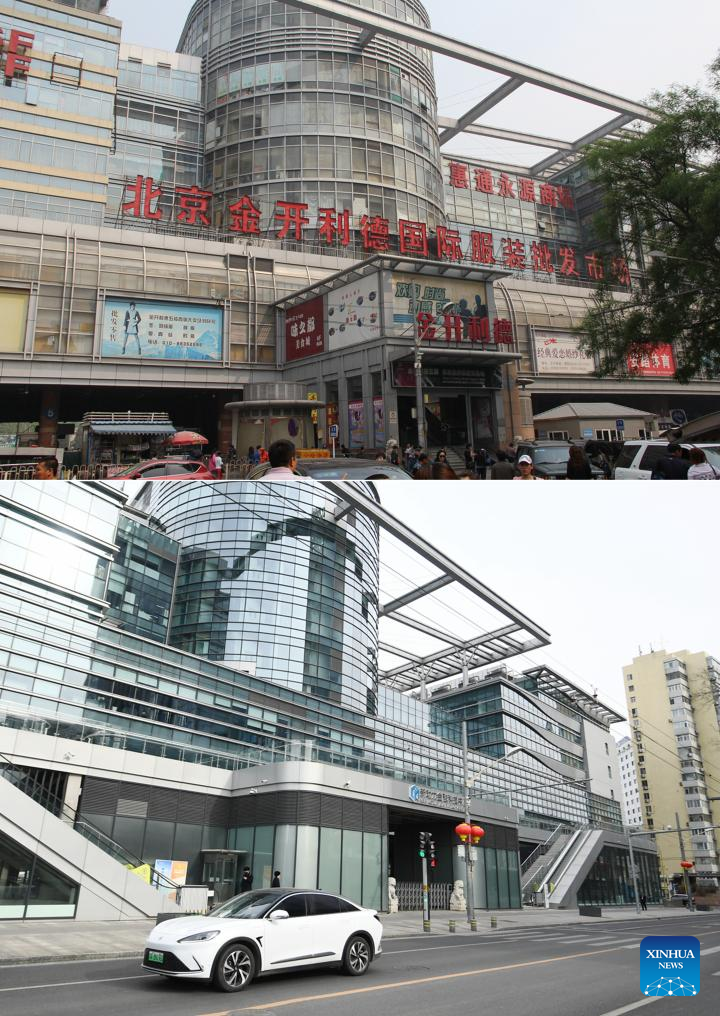Feature: From fabric to fintech: transformation of Beijing's wholesale market injects new momentum into high-quality development
Source: Xinhua
Editor: huaxia
2025-08-17 21:44:01

This combo photo shows Zhonghe Market (above, a file photo taken on April 25, 2014) and a plaza of the New Actuation Fintech Center built on the former site of Zhonghe Market (below, taken by Xinhua photographer Zhang Chenlin on Feb. 1, 2024) in Beijing, capital of China. (Xinhua)
BEIJING, Aug. 17 (Xinhua) -- Li Rong, a 37-year-old Beijinger, has just opened a bakery in the city's Fintech New Zone, a hub buzzing with startups. Her warm, buttery pastries are already a hit among young entrepreneurs and fresh graduates in the area.
"Many people working here might not realize that it used to be northern China's largest garment distribution center," she said. "Who would have thought it could transform so dramatically into today's hub of innovation?"
Over a decade ago, Li used to spend weekends here hunting for the latest jeans, trench coats and leather jackets -- trendy yet affordable. She remembered the market teeming with shoppers hauling sacks or dragging carts, stocking up for resale. "It was lively and budget-friendly," she said, "but also a little chaotic."
MARKET'S FAREWELL, CITY'S LEAP FORWARD
In the 1980s, vendors began to gather around areas near the Beijing Zoo, the Beijing Exhibition Center, the Beijing Planetarium and a public transport hub. As the variety of goods increased, these informal roadside stalls gradually evolved into indoor shops, eventually forming a sprawling wholesale market cluster specializing in clothing and small commodities.
However, as time went on, its limitations became evident: overcrowding, traffic congestion, and mounting pressure for environmental improvement and industrial upgrading.
In its heyday, the market attracted 100,000 customers daily. Despite contributing 60 million yuan (8.36 million U.S. dollars) in annual revenue to Xicheng District, it costs the government some 100 million yuan (13.9 million dollars) each year to handle its transportation and environmental issues.
Beginning in 2015, the malls surrounding the Beijing Zoo have been shut down one by one, as the capital started purging itself of non-essential businesses to reduce traffic congestion and population density, while paving the way for high-end industries. This marked a breakthrough in the long-standing effort to phase out the wholesale markets.
While exploring new development strategies, the district put forward a preliminary proposal in early 2018 to transform the former Beijing Zoo wholesale market into a pilot zone for fintech innovation.
ANCHORING INNOVATION IN THE PAST
The corridors, once packed with noisy crowds and overflowing garment racks, are now adorned with lights and rotating art installations.
"Now it's different," said the bakery owner. "Cleaner, quieter, yet buzzing with a kind of new energy."
That "new energy" is more than just a vibe -- it reflects the city's drive to foster new quality productive forces.
Located just north of Financial Street and south of Zhongguancun, the area enjoys convenient transportation, as well as strategic and resource advantages in developing the fintech industry.
The New Actuation Fintech Center serves as a core building within the Fintech New Zone. Transformed into a "next-generation smart city complex," the center showcases the vision and vitality of the Fintech New Zone, offering innovative design and professional operational services that reflect a forward-thinking approach.
Beyond fintech, the district's rebirth also represents a broader rebalancing of economic modernization and cultural confidence.
At JK FUN, an underground mall transformed from a wholesale market, a special exhibition has been set up to showcase this remarkable shift. With the push of a button, visitors can hear recordings of the past -- the familiar voices of buyers and sellers bargaining over prices.
HIGH-QUALITY DEVELOPMENT MODEL
Today, the former Beijing Zoo wholesale market area has embarked on a new path of high-quality development. While the number of workers, daily foot traffic, individual vendors and businesses has declined, tax revenue has grown.
"We are now building a service-oriented platform for the industry -- a window that not only provides support for enterprises, but also hosts a variety of ongoing activities. It serves as a permanent exhibition hall and scenario-based showcase for fintech innovation," said Li Qian, general manager of Beijing New Actuation Fintech Asset Operation and Management Co., Ltd.
"Our focus is on how to better serve the industry. Every enterprise we work with brings its own application scenarios to drive the development of emerging industries and new technologies," she added.
Gao Yi, general manager of Beijing Hua Rong Jin Ke Technology Development Co., Ltd, believes the transformation of this area has a positive ripple effect on the neighborhoods.
As China pursues new quality productive forces and high-quality development, the capital is leading its way in transformation. Projects like the New Actuation Fintech Center are now springing up across the country.
Small eateries have popped up as more companies settle in the zone. "Sometimes I reminisce about the hustle and bustle of the old wholesale market here when I was young," said Li.
"But I prefer today's atmosphere. With the smell of fresh bread in the air and so many talented young people working hard, the future feels full of endless possibilities," she added. ■

This combo photo shows Sida Building (above, a file photo taken on April 25, 2014) and the New Actuation Fintech Center renovated from the former Sida Building (below, taken by Xinhua photographer Zhang Chenlin on Feb. 1, 2024) in Beijing, capital of China. (Xinhua)



